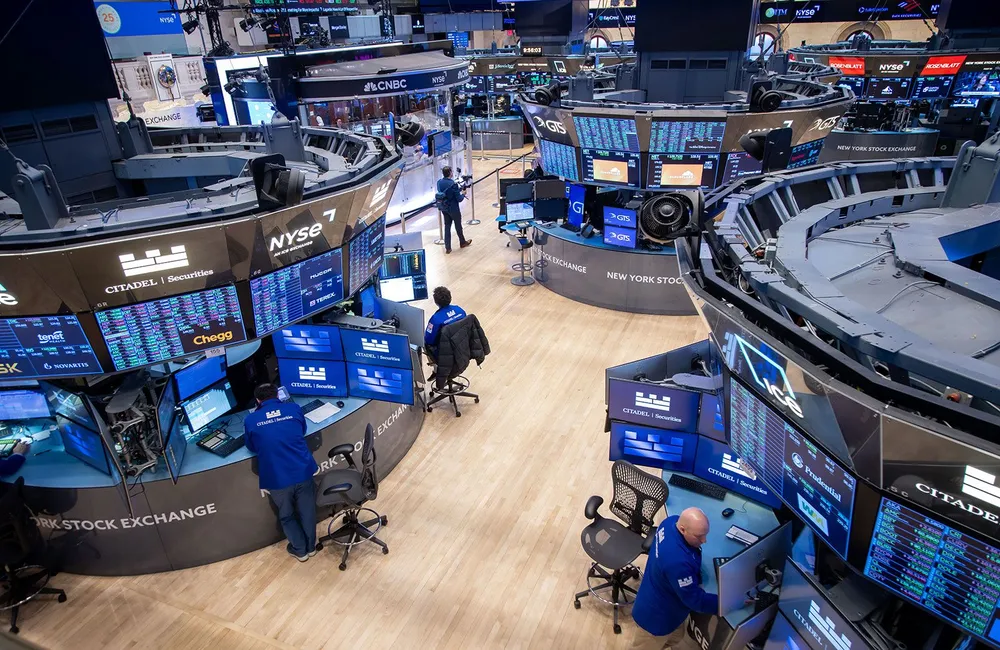Meanwhile, the March Consumer Confidence Index ticked up from February, beating expectations.
ASX futures had slipped 27 points or 0.4% as of 7:00am on Wednesday, suggesting a lower open.
US technology stocks slid Tuesday, dented by rising bond yields, as an ebbing of the recent turmoil in the banking sector shifted investors' attention back to the threat of further interest rate increases by the Federal Reserve.
Many investors speculated earlier this month that the high-profile failures of SVB Financial and Signature Bank would test the Fed's resolve in its efforts to fight inflation. Now, easing anxiety about global banks is leading them to renew bets that interest rates could rise further and stay elevated for longer.
The tech-heavy Nasdaq Composite fell 0.5%. The broad S&P 500 index declined 0.2% after rising slightly Monday, while the Dow Jones Industrial Average shed 0.1%.
The communications-services sector weighed on the S&P 500, dropping 1%, as Treasury yields rose. Higher yields on government debt allowed investors to lock in solid long-term returns with little risk, dimming the appeal of tech and other growth shares that have the potential for generating windfall profits many years in the future.
As fear about financial distress subsides, more traders are wagering that the banking sector crisis will not spill over into the broader economy. That shift showed investors wondering once again whether good news for the economy might be bad news for stock prices, because it implies the Fed may act more aggressively.
In commodity markets, Brent crude oil added 0.9% to $US78.79 a barrel while gold also gained 0.9% to US$1,973.86.
Australian government bonds rose, with the 2 Year yield edging up to 2.91% and the 10 Year rising to 3.29%. US Treasury notes remained lower, with the 2 Year slipping to 4.05% and the 10 Year dipping to 3.56%.
The Australian dollar increased to 67.00 US cents after previously closing at 66.48. The Wall Street Journal Dollar Index, which tracks the US dollar against 16 other currencies, inched lower to 96.00.
Asia
Chinese shares closed lower as reopening optimism faded and investors re-evaluated the country's recovery. Sentiment was likely hit by the sharp decline in industrial profits for January-February and recent weak corporate earnings. Chip makers drove the losses, with SMIC dropping 0.8% and Naura losing 2.0%. Though other data have been more upbeat, "there are still significant headwinds facing the economy," HSBC Global Research economists said. The property sector has yet to stabilize and consumer sentiment has only improved marginally, with the labor market still muted and exports declining. Telecom shares rose amid recent volatility. China Unicom added 2.4% and China Mobile gained 0.6%. The benchmark Shanghai Composite Index fell 0.2% to 3245.38. The Shenzhen Composite Index dropped 0.7% and the ChiNext Price Index lost 1.2%.
Hong Kong's benchmark Hang Seng Index ended 1.1% higher at 19784.65, as investors' concerns over the global banking crisis eased following news that a U.S. regional lender is buying large parts of Silicon Valley Bank. Jing Ning, head of equities at Fidelity International, said in a webinar that the Hong Kong market is not in a bad place given its attractive valuation amid geopolitical tension and a global banking crisis. The Hang Seng Tech Index rose 0.9%, with Tencent Holdings increasing 4.2% and Meituan up 2.4%. Among the losers were Tingyi (Cayman Islands) Holding Corp., which dropped 10% after reporting weak earnings.
Japanese stocks ended higher, led by gains in financial shares, as concerns about the recent turmoil in the global banking sector receded. Resona Holdings gained 4.1%, Sumitomo Mitsui Financial Group advanced 2.7% and Dai-ichi Life Holdings added 2.5%. The Nikkei Stock Average rose 0.2% to 27518.25.
In India, the Sensex edged 0.1% lower to close at 57613.72, erasing earlier gains amid a cautious mood. Investors continued to assess the banking turmoil in Europe and the US. Losses in the benchmark index were led by IT and telecom-related stocks. Tech Mahindra slipped 2.9%, Bharti Airtel dropped 1.9% and Wipro lost 1.4%. Meanwhile, IndusInd Bank rose 2.3%, Power Grid Corp. of India added 1.2% and HDFC Bank was up 0.9%.
Europe
European stocks closed broadly flat after mixed trading in Asia. The pan-European Stoxx Europe 600 lost less than 0.1% while the German DAX and the French CAC 40 gained 0.1%. "It's a quiet day on the macro data front, though the U.S. Conference Board's Consumer Confidence index will be released for March," Danske Bank analysts said in a note. "Consensus is looking for a modest decline."
The British FTSE 100 closed up 0.2% as the short-lived rally seen the previous day appeared to stall, and recession fears began to re-emerge. While the banking crisis seems to have subsided, stocks have been unable to find a reason to push higher this afternoon, IG analyst Chris Beauchamp said. There still appears to be an abundance of caution when it comes to driving prices higher in the wake of last week’s turmoil. Outperformance from the basic resources and energy sectors offset weakness in commercial real estate, helping to keep the index in positive territory, CMC Markets analyst Michael Hewson explained.
North America
US technology stocks slid Tuesday, dented by rising bond yields, as an ebbing of the recent turmoil in the banking sector shifted investors' attention back to the threat of further interest rate increases by the Federal Reserve.
Many investors speculated earlier this month that the high-profile failures of SVB Financial and Signature Bank would test the Fed's resolve in its efforts to fight inflation. Now, easing anxiety about global banks is leading them to renew bets that interest rates could rise further and stay elevated for longer.
The tech-heavy Nasdaq Composite fell 0.5%. The broad S&P 500 index declined 0.2% after rising slightly Monday, while the Dow Jones Industrial Average shed 0.1%.
The communications-services sector weighed on the S&P 500, dropping 1%, as Treasury yields rose. Higher yields on government debt allowed investors to lock in solid long-term returns with little risk, dimming the appeal of tech and other growth shares that have the potential for generating windfall profits many years in the future.
Shares of Advanced Micro Devices, which makes computer chips, fell 2.1%. Meta Platforms, the parent company of Facebook, declined 1.1%, while Apple fell 0.4%.
As fear about financial distress subsides, more traders are wagering that the banking sector crisis will not spill over into the broader economy. That shift showed investors wondering once again whether good news for the economy might be bad news for stock prices, because it implies the Fed may act more aggressively.
Tuesday's reading of the Case-Shiller index showed that home prices continued to slide in January, but a trickle of more recent data sent upbeat signals. A March consumer-confidence survey from the Conference Board, for instance, showed greater economic optimism than forecasters had expected. The Richmond Fed said its latest survey showed improved business conditions for manufacturers in the bank's five-state region spanning Maryland to South Carolina.
"People are waiting to see if there's going to be another leg to this banking story, and there's an aspect to it that no news is good news," said Andrew Hollenhorst, chief US economist at Citi. "But if the financial stability concerns abate a bit, the attention shifts back to inflation."
Bets in fed-funds futures markets show that many traders think that the Fed won't raise interest rates again at its next meeting, scheduled for the first week of May. But given that inflation remains well above the Fed's target, that assumption may be misguided, Mr. Hollenhorst said.
Even if the Fed holds rates steady at the current target level of 4.75% to 5.00% over the next several months, its stance would be more restrictive than many investors now expect, given that some are forecasting the central bank will start cutting rates by the end of the year, according to CME Group's futures-market tracker.
Despite a steadier week for regional banks, their stocks faced more pressure on Tuesday. Michael Barr, the Fed's vice chairman for supervision, told lawmakers that the Fed may favor tougher rules for banks in its role as a financial regulator. The KBW regional bank index fell 0.2%, reversing earlier gains.
Among individual financial shares, Charles Schwab lost 1.8%. Some stock and bond investors have added bank shares and their debt to their portfolios over the past week, seeing discounts following this month's selloff.





















